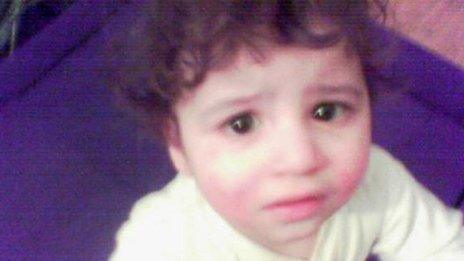Hamzah Khan: Minister attacks starved boy review findings
- Published

Hamzah Khan was deprived of food and drink over a period of years by his alcoholic mother
The government has strongly criticised a report that said a four-year-old boy starved to death after being let down by "national systems".
Hamzah Khan's body was found in his Bradford home in 2011, almost two years after he died.
His mother Amanda Hutton, 43, was jailed for 15 years last month after being found guilty of manslaughter.
Children's Minister Edward Timpson said the report did not explain why chances to protect Hamzah were missed.
He said he had "deep concerns" about the serious case review because it "fails to explain sufficiently clearly" what actions social workers took when problems in the Khan family were brought to their attention.
Professor Nick Frost: "There was no thorough, multi-agency assessment"
He said the answers to the "glaring absences" from the review must be made public to "ensure such mistakes will not be repeated in the future".
Professor Nick Frost, chairman of Bradford Safeguarding Children Board, said the review was "very clear that Hamzah's death could not have been predicted".
He said it found that systems - "many of them national systems" - let Hamzah down "both before and following his death".
He added: "I cannot give assurance that a tragedy like this will never happen again."
Bradford Council said "national systems" included procedures in place by services such as education and health.
During his life, Hamzah missed a series of appointments at hospital, with health visitors and GPs, and he did not receive routine immunisations.
The child should have started primary school in September 2010 - a year before his body was found - but his mother answered questions about his absence by claiming he was in Portsmouth with an uncle.
The report stated: "There are important questions for local and national policy in regard to how many of the systems for the universal health care and education of children rely on parents registering their children for such routine services."
It added: "The absence of clear disclosures or not seeing the information such as the failure to attend immunisations as a source of harmful behaviour rather than isolated incidents contributed to the lack of assertive and pro-active approach in the case."
Responding to Mr Timpson's criticism, Kath Tunstall, strategic director of children's services in Bradford, said there "was absolutely no attempt to whitewash".
'Completely lost'
She added: "We are determined to improve, we are constantly wanting to learn and improve.
"If the minister is going to assist us with that by asking more challenging questions then we welcome that."
The report said a "theme" of the case review was "the extent to which Hamzah was unknown and invisible to services throughout his short life".
It added that Hamzah was "invisible to services largely because neither of his parents participated in the routine processes".
The NSPCC's head of policy David Tucker said: "I have never heard before in any serious case review of a child being so completely lost."
During Hutton's trial, Bradford Crown Court heard how the mother-of-eight was living in "breathtakingly awful" conditions with five of her young children as well as Hamzah's mummified remains.

During Hutton's trial, the court heard of the "breathtakingly awful" conditions she lived in
The boy's body was found after a police community support officer became concerned about children at the house while she was investigating reports of soiled nappies being thrown into a neighbour's garden.
Officers who later found Hamzah were also faced with an overwhelming smell coming from ankle-deep rubbish in the house, including vodka bottles and rotting food.
The court was told the family was known to all the main agencies yet Hutton had a history of failing to co-operate with services that could have helped her.
Hamzah missed a series of appointments at hospital, with health visitors and GPs and he did not receive routine immunisations, the court heard.
Prof Frost stressed that it was Hutton who was responsible for Hamzah's death.
He said: "In my 35 years of involvement in children's services, I have never come across a case that can even be compared to this one."
He said there was "a unique combination of events: a mother who was determined not to co-operate even with the most necessary and essential of services".
He said Hutton had "managed to mislead professionals and relatives about the whereabouts of Hamzah".
Nancy Palmer, independent chairwoman of the serious case review, said: "It is important to be clear that Hamzah died because he was neglected by his mother."
She added the panel concluded information known to agencies at the time "does not suggest that Hamzah's death was a predictable event".
- Published13 November 2013
- Published13 November 2013
- Published4 October 2013
- Published3 October 2013